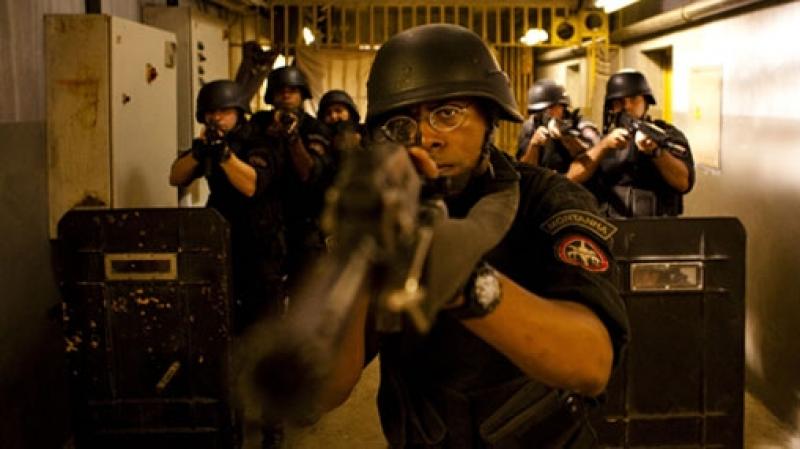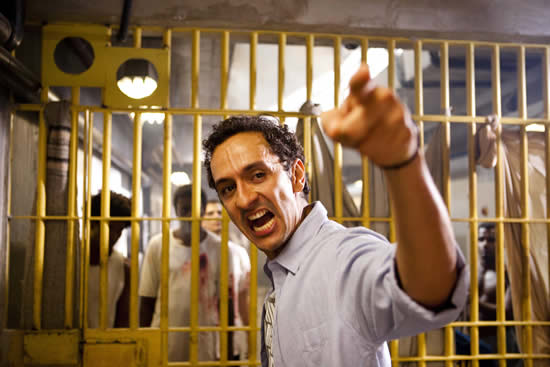Elite Squad: The Enemy Within | reviews, news & interviews
Elite Squad: The Enemy Within
Elite Squad: The Enemy Within
From Brazil, the most politically engaged and best action film this year

This is ferocious popular cinema. The original Elite Squad (2007) was an iconic hit in Brazil, detailing the training, private lives and bloody ghetto raids of BOPE, the black-suited elite Rio police force led by charismatic Captain Nascimento (Wagner Moura). Director José Padilha resisted offers to convert the film’s commercial clout into a TV franchise, instead expanding this sequel into a total indictment of Brazilian society.
Sweaty energy and ruthless narrative momentum grip from the start. Nascimento is stalked by undercover police and apparently shot to pieces, then we flashback to a savage prison riot, put down by BOPE under (now) Colonel Nascimento’s command with equal ruthlessness. As narrator of both films, Nascimento has Harry Callahan-style contempt for the film-makers’ liberal values, embodied in charismatic civil rights campaigner Fraga (Irandhir Santos, pictured below). Domestic conflict makes these two moral poles of the film more intimately hostile, as Fraga is married to Nascimento’s wife from the first film, Rosane (Maria Ribeiro), and a rival father figure to his teenage son. This leads to Latin telenovela soap-operatics, but also nerve-ending ties between the personal, political and policing. “Pressure builds at home?” Nascimento explains. “I release it in the streets.”
The disastrous aftermath of the prison riot makes Nascimento a popular hero and liberal demon, forcing Rio’s ruling politicians to kick him upstairs into an administrative post. This allows a panoramic overview of what Nascimento contemptuously calls “the System”, only glimpsed at the edges of the more conventional first film. His crude new policy to brutally suppress the drug trade in the favelas (ghettos), intended to deprive dirty cops of their pay-offs and so make the System’s corruption wither, instead reveals that corruption’s cancerous totality. Police militias simply replace the drug lords in skimming from the whole ghetto economy, turning everything from cable TV to votes into a cop-run, ultra-violent protection racket. The state’s political class is delighted, the System now operating with still slicker efficiency to the benefit of everyone except the favelas’ inhabitants. Nascimento’s policeman’s outrage gives him unlikely common cause with Fraga’s liberal dismay, but the sheer scale of Brazil’s civic rot makes this a conspiracy thriller in which the conspiracy being fought is infinite and endemic. It’s like Dirty Harry deciding to take on Richard Nixon.
 Editor Daniel Ezende has helped Padilha make a film whose two hours feel muscularly fast, even as each scene in its intricate mosaic is given human space to breathe. The uniformly superb lead actors’ intense nervous energy is ratcheted up by hand-held filming. Wagner Moura, whose original performance as Nascimento made him a Brazilian icon, has a pretty face darkened by a quiet, constant edge of unhappiness and violence. Irandhir Santos’s Fraga could have stepped from a crusading Sidney Lumet film of the 1970s. And around them strut Dickensian grotesques like Fortunato, the fat, blustering politician and TV demagogue who prefers to be called “Godfather”.
Editor Daniel Ezende has helped Padilha make a film whose two hours feel muscularly fast, even as each scene in its intricate mosaic is given human space to breathe. The uniformly superb lead actors’ intense nervous energy is ratcheted up by hand-held filming. Wagner Moura, whose original performance as Nascimento made him a Brazilian icon, has a pretty face darkened by a quiet, constant edge of unhappiness and violence. Irandhir Santos’s Fraga could have stepped from a crusading Sidney Lumet film of the 1970s. And around them strut Dickensian grotesques like Fortunato, the fat, blustering politician and TV demagogue who prefers to be called “Godfather”.
Hollywood smuggled sometimes radical political content into many of its best action films of the Nineties - Australian director Philip Noyce’s Harrison Ford-starring Clear and Present Danger (1994), for instance, turned a Tom Clancy CIA yarn into an indictment of George W Bush’s War on Drugs. That hasn’t happened much lately, and Padilha’s exponential increase in sophistication and scope since Elite Squad has more in common with Scorsese’s Casino (1995), which went beyond even his own gangster epics to turn a sociological eye on the Vegas Mob, showing its workings from top to bottom. More particularly, Padilha is returning to the moral imperatives of his great breakthrough documentary Bus 174 (2002), an examination of a favela man who took a bus’s passengers hostage and the catastrophic state response. Like Elite Squad it was a great popular hit in Brazil, where 10 million cinema-goers have already rushed to see The Enemy Within. The final scenes, taking Nascimento and Padilha’s j’accuse to the country’s capital Brasilia, boldly indict its current rulers in the carnage we’ve just witnessed. “How do you think they paid for all of this?” Nascimento’s narration wonders, as the camera pans over vast antiseptic tracts of politicians’ real estate. “No wonder slums exist.” The mass audience Padilha’s skill has mobilised clearly recognise the crime he’s reporting.
Watch the trailer to Elite Squad: The Enemy Within
Add comment
more Film
 That They May Face The Rising Sun review - lyrical adaptation of John McGahern's novel
Pat Collins extracts the magic of country life in the west of Ireland in his third feature film
That They May Face The Rising Sun review - lyrical adaptation of John McGahern's novel
Pat Collins extracts the magic of country life in the west of Ireland in his third feature film
 Stephen review - a breathtakingly good first feature by a multi-media artist
Melanie Manchot's debut is strikingly intelligent and compelling
Stephen review - a breathtakingly good first feature by a multi-media artist
Melanie Manchot's debut is strikingly intelligent and compelling
 DVD/Blu-Ray: Priscilla
The disc extras smartly contextualise Sofia Coppola's eighth feature
DVD/Blu-Ray: Priscilla
The disc extras smartly contextualise Sofia Coppola's eighth feature
 Fantastic Machine review - photography's story from one camera to 45 billion
Love it or hate it, the photographic image has ensnared us all
Fantastic Machine review - photography's story from one camera to 45 billion
Love it or hate it, the photographic image has ensnared us all
 All You Need Is Death review - a future folk horror classic
Irish folkies seek a cursed ancient song in Paul Duane's impressive fiction debut
All You Need Is Death review - a future folk horror classic
Irish folkies seek a cursed ancient song in Paul Duane's impressive fiction debut
 If Only I Could Hibernate review - kids in grinding poverty in Ulaanbaatar
Mongolian director Zoljargal Purevdash's compelling debut
If Only I Could Hibernate review - kids in grinding poverty in Ulaanbaatar
Mongolian director Zoljargal Purevdash's compelling debut
 The Book of Clarence review - larky jaunt through biblical epic territory
LaKeith Stanfield is impressively watchable as the Messiah's near-neighbour
The Book of Clarence review - larky jaunt through biblical epic territory
LaKeith Stanfield is impressively watchable as the Messiah's near-neighbour
 Back to Black review - rock biopic with a loving but soft touch
Marisa Abela evokes the genius of Amy Winehouse, with a few warts minimised
Back to Black review - rock biopic with a loving but soft touch
Marisa Abela evokes the genius of Amy Winehouse, with a few warts minimised
 Civil War review - God help America
A horrifying State of the Union address from Alex Garland
Civil War review - God help America
A horrifying State of the Union address from Alex Garland
 The Teachers' Lounge - teacher-pupil relationships under the microscope
Thoughtful, painful meditation on status, crime, and power
The Teachers' Lounge - teacher-pupil relationships under the microscope
Thoughtful, painful meditation on status, crime, and power
 Blu-ray: Happy End (Šťastný konec)
Technically brilliant black comedy hasn't aged well
Blu-ray: Happy End (Šťastný konec)
Technically brilliant black comedy hasn't aged well
 Evil Does Not Exist review - Ryusuke Hamaguchi's nuanced follow-up to 'Drive My Car'
A parable about the perils of eco-tourism with a violent twist
Evil Does Not Exist review - Ryusuke Hamaguchi's nuanced follow-up to 'Drive My Car'
A parable about the perils of eco-tourism with a violent twist

Comments
...